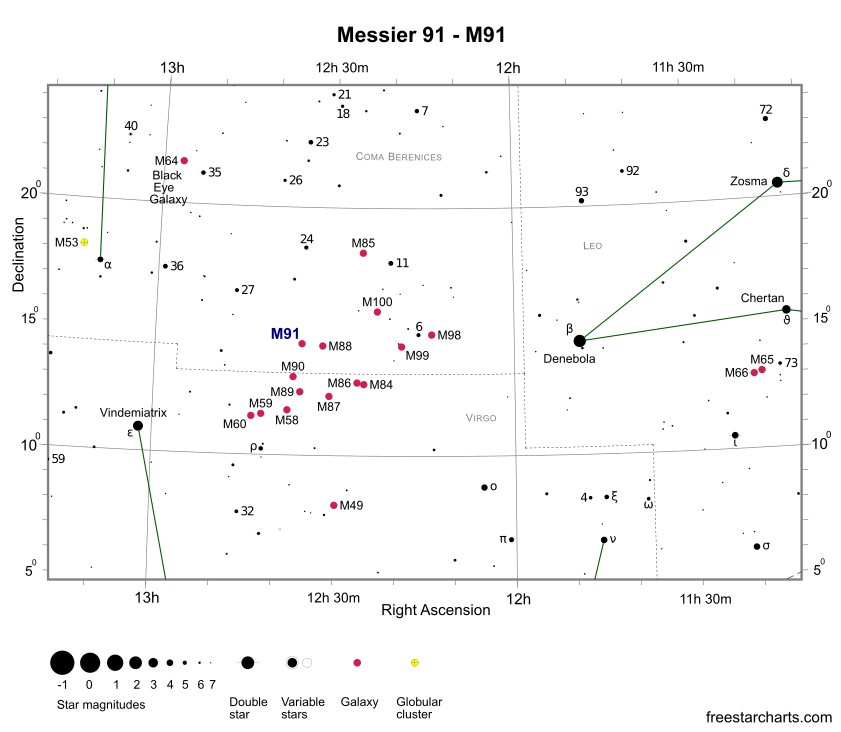M91, mag. +10.3, is a barred spiral galaxy located in the southern part of the constellation of Coma Berenices. It's a member of the Virgo cluster and was discovered by Charles Messier on March 18, 1781. This was a most productive night for Messier. He discovered eight objects, all of them Virgo cluster galaxies, and also rediscovered globular cluster M92 in Hercules. When recording the position of M91, Messier incorrectly referenced its location from M58 instead of intended galaxy M89. It was only a degree mistake, however the result meant that the object was missing for almost 200 years! Some astronomy detective work by William Williams finally solved the mystery. In 1969, he pinpointed its location and concluded that M91 was almost certainly the same galaxy as NGC 4548.
Finding M91 can be challenging. The galaxy is positioned about a degree north of the Coma Berenices-Virgo constellation boundary but there are no bright stars in the vicinity. The general area of sky can be located by imagining a line connecting Denebola (β Leo - mag. +2.1) with Vindemiatrix (ε Vir - mag. +2.8). About 60% of the way along this line is elliptical galaxy, M89 (mag. +10.0), with M91 positioned a further two degrees directly north.
M91 and the Virgo cluster galaxies are best seen during the months of March, April and May.


Finder Chart for M91 - pdf format (credit:- freestarcharts)
M91 is one of the fainter Messier galaxies and is generally considered as one of the more difficult objects in the list. Through a medium size scope, of the order of 150mm (6-inch) or 200mm (8-inch) aperture, it appears as a faint ball of light that's brighter towards the centre. In total, the galaxy spans 5.4 x 4.3 arc minutes of apparent sky. On dark nights, with good transparency, the centre bar shape is evident with hints of the spiral structure visible. The spiral arms are better seen with larger size amateur scopes.
M91 is about 63 million light-years distant and has a spatial diameter of 100,000 light-years. It's estimated to contain 400 billion stars.
M91 Data Table
| Messier | 91 |
|---|---|
| NGC | 4548 |
| Object Type | Barred Spiral galaxy |
| Classification | SBb(rs) |
| Constellation | Coma Berenices |
| Distance (light-years) | 63 Million |
| Apparent Mag. | +10.3 |
| RA (J2000) | 12h 35m 27s |
| DEC (J2000) | +14d 29m 48s |
| Apparent Size (arc mins) | 5.4 x 4.3 |
| Radius (light-years) | 50,000 |
| Number of Stars | 400 Billion |
| Notable Feature | Member of the Virgo Cluster of galaxies |